

Much is made of the influx of migrant workers working in the 'edible' horticulture sector and questions asked why we cannot find sufficient 'home grown' workers........there are many opportunities in the UK horticulture sector for young people to embark on a rewarding career, but education IS the key factor!
Over the last 40-50 years, Hadlow College was THE place for those entering the fruit industry to learn their horticulture skills: the pressure on the top fruit industry (apples & pears) in the period between 1980 and the new millennium pressures from increasing levels of cheap imported apples & pears resulted in a contracting top fruit industry. This meant far fewer potential young entrants into colleges like Hadlow - 'many farmers sons & daughters' disillusioned with their prospects left the industry to seek opportunities elsewhere...
Access to training orchards is vital for educating Hadlow College students in the practical aspects of top fruit husbandry. The BIFGA and Huxley orchards deliver that 'valuable' resource.....The BIFGA orchard was instigated by BIFGA Chairman John Breach and supported by the BIFGA membership. This orchard has over 40 varieties. With 10 trees of each variety, this is a double resource enabling BIFGA members an opportunity to evaluate new varieties (many bred overseas) and Hadlow Students access to the different varietal 'traits' in each variety....
Below: left; the Huxley Training Orchard and right; La Flamboyante one of the 40+ varieties in the BIFGA Orchard
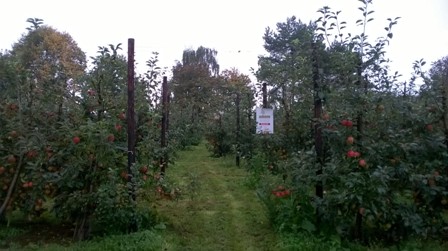
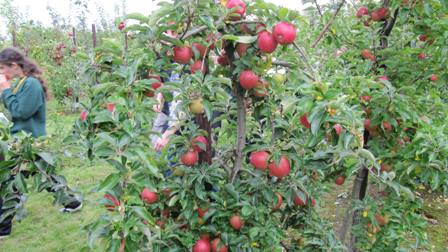
Click on La Flamboyante for more information on that variety........
Many of today's growers - now in their 50's & 60's learnt their skills at Hadlow; with the lack of young people coming forward, Hadlow came under pressure in the 1990's and changed direction with amenity horticulture becoming THE career target for many new Hadlow entrants.
With an 'uplift' in the top fruit industry during the new millennium (after many years of decline) the need for a new initiative to attract young people into a college education with the prospect of fruit as their career target, was launched with the introduction of Pip to Plate....the event brings 14-16 year old children from schools in the surrounding villages to Hadlow with the intention of demonstrating the opportunities open to a college education leading to a rewarding career in the fruit industry.
Pip to Plate is a 'process map' highlighting key stages of apple production from 'the history of apples' via breeding and propagation and budding & grafting techniques, orchard management, innovative technology, harvesting, storage techniques, and marketing criteria and career opportunities.....
This year the Pip to Plate event opened with a welcome and introduction to the event and a short history of top fruit by Ryan Williams a former graduate and apprentice of Hadlow College now working for Avallon Produce Ltd.
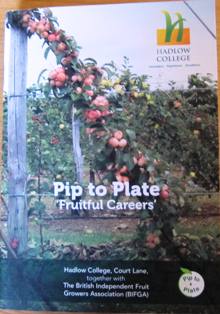
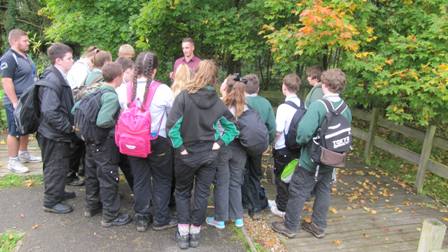
Propagation
Next stop: Fruit industry nurseryman Will Seabrook demonstrated the skills required to graft scion wood (the variety) onto the rootstock; demonstrating the grafting and budding techniques used to replicate a variety, a technique first discovered more than 3,000 years ago in the Valley of the Euphrates ....
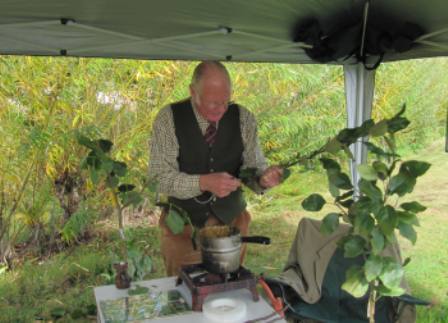
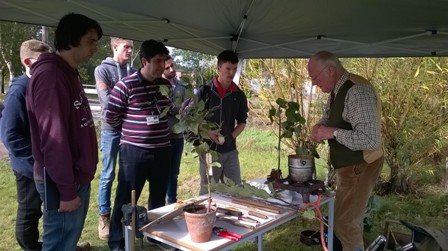
New Technology: Robots are frequently proposed as the answer to many aspects of fruit production: 'harvesting' the most high profile.....but other robot capabilities are being developed to manage important management tasks.
At Pip to Plate - Dr Jonathan Storey i3d robotics demonstrated a robotic system funded by an Innovate Uk grant.
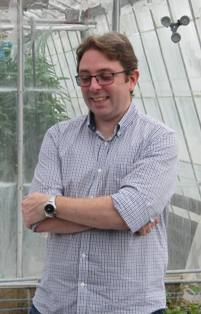
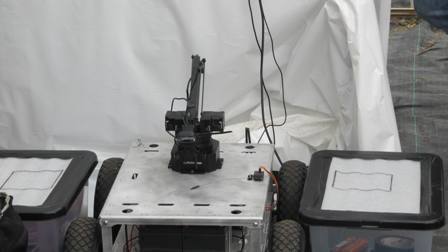
i3D robotics is working with Hadlow Agricultural College to monitor sweet peppers in one of their glasshouses. Two robotic systems are being developed: a fixed network of sensors to measure environmental conditions in the glasshouse (ambient light, temperature, pressure, relative humidity) and a mobile platform (rover) for autonomous crop inspection. The mobile platform will be able to locate fruit in images, using state-of-the-art computer vision techniques, before performing spectral analysis on individual peppers.
Sensors can generate a huge amount of data, so it is critical that only useful information is presented to users (who may not be familiar with the technology). i3Dr is developing a suite of tools to process and visualise sensor data to provide growers with simple outputs, for example displaying a 'traffic light' for ripe/unripe, as well as more sophisticated options if required. The technology is readily transferrable to other crops and will enable growers to obtain insightful quantitative information such as yield estimates, detect issues such as heating or irrigation failures, or reliably determine the best time to harvest.
Below: left; Dr. Jonathan Storey with pupils from Wilmington School and right; a rare picture of The EAM (2nd from left) with Rob Stobart (left) and Annabel Penela from Sainsburys and (right) Dr. Jonathan Storey;
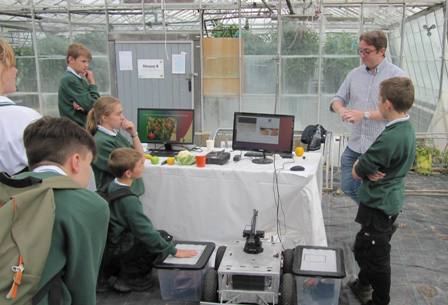
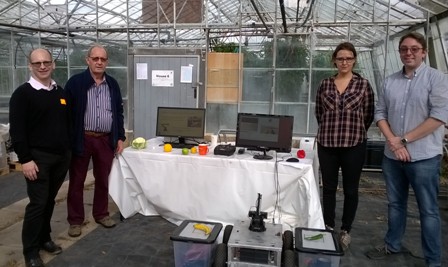
Stage 4 - out in the BIFGA orchard - Harvesting
Brian Tompsett led students in an exercise 'picking fruit' - each group using picking buckets, and picking apples to go for juice
Below: left; Brian Thompsett addresses visiting schools...and right;
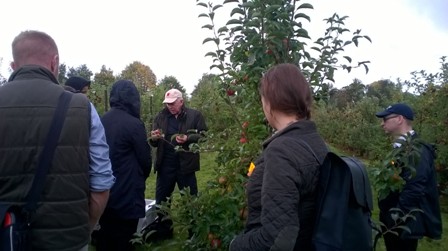
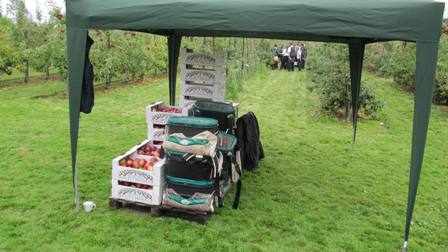
Stage 5 - Post-Harvest - Clare Hogan
Clare explained the storage process: 'The Principles of Fruit Storage and How to Keep Foods Fresh' dealing with 'short and long term' storage, ensuring longer supply to markets throughout the year - typically as long as 9 months. Clare explained Controlled Atmosphere (CA) storage conditions - fulfilling customer expectations and importantly getting the best price for the grower...
Stage 6 - Processing
HE students Lauren & Candace - helped the pupils convert fresh apples into juice using apple corers and an electric domestic juicer
Stage 7 - Careers, future of the industry
John Guest (The English Apple Man) and and Theresa Huxley (Sainsburys) with her colleagues Rob Stobart and Annabel Penela; promoted HE (Higher Education) with demonstrations of the specification requirements and how those requirements are assessed...Theresa explained the importance of delivering good red colour on bi-coloured varieties (Cox, Gala, Braeburn etc) and taste expectations measured by texture (firmness) and brix (sugars) - pupils were able to view brix levels on a refractometer.
Rob Stobart explained the importance of good agricultural practices (GAP) and his responsibility for ensuring Sainsburys suppliers meet those expectations. Annabel Penela informed pupils about how she is responsible for auditing suppliers at home and in overseas supplier sources.
The English Apple Man told the pupils the opportunities in the fruit industry were very rewarding; financially and personally, but it is important to be prepared to start on the lower rungs of the ladder and gain experience while progressing to more responsible positions. Be it in technology, management, agricare etc. the opportunities are endless for this with a good education in horticultural practices (Hadlow College etc) and a strong work ethic.
In summary, we agreed the Pip to Plate 'module' is an ideal event for bringing attention to the opportunities in a fruit production career. However we also recognise the challenge we face in inspiring 'the next generation'
That is all for this week........by the time this goes on-line, The English Apple Man and his wife will be in Malta on holiday...
Take care
The English Apple Man